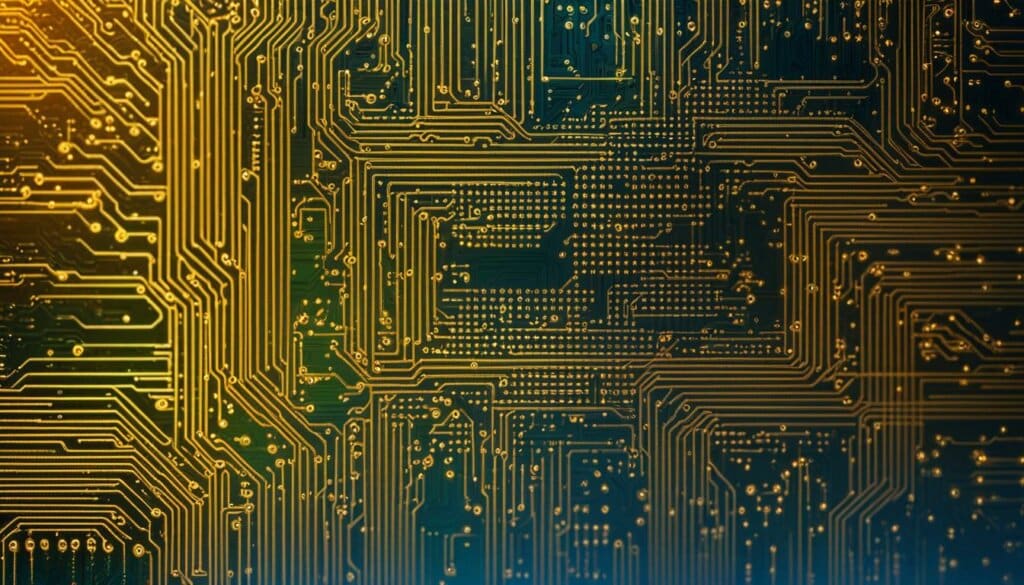Table of Contents
Computer engineering, software engineering, computer science, electrical engineering, computer systems, programming languages, hardware design, web development, and computer networks are all vital aspects of the rapidly evolving technology landscape. In this article, we delve into the insights and innovations that drive the computer engineering industry forward.
The computer engineering market is projected to reach XX million US dollars by 2030, with a CAGR of xx%. This growth is fueled by the increasing demand in diverse sectors such as automotive, communication systems, industrial, medicine, and consumer computer equipment. Leading manufacturers like Dassault Systemes, ARM Holdings, Intel Corporation, and Autodesk have played a significant role in shaping the global computer engineering market.
In the next sections, we will explore the different types of computer engineering products available in the market, the implications of technological trends on computer engineering, the crucial role of IT in driving innovation, and the importance of staying ahead of industry innovations and emerging trends.
Types of Computer Engineering Available in the Market
Computer engineering encompasses a wide range of products to cater to various needs and applications in industries such as automotive, communication systems, industrial, medicine, and consumer computer equipment. Let’s explore the different types of computer engineering available in the market.
Personal Computers
Personal computers, also known as PCs, are the most common type of computer engineering product used by individuals and businesses. These devices are designed for general-purpose computing and offer a range of capabilities, from basic tasks like web browsing and document editing to more demanding applications such as gaming and video editing.
Supercomputers
Supercomputers are high-performance machines capable of processing massive amounts of data at incredible speeds. They are used in scientific research, weather forecasting, complex simulations, and other applications that require extensive computational power. Supercomputers enable breakthroughs in fields like astrophysics, molecular modeling, and climate science.
Mobile Computer Hardware
Mobile computer hardware refers to devices such as smartphones and tablets that combine computing power, communication capabilities, and portability. These devices have become an integral part of our daily lives, enabling us to stay connected, access information on-the-go, and perform a wide range of tasks through mobile applications.
Server Computer Hardware
Server computer hardware powers the internet and plays a critical role in supporting various online services. Servers act as central repositories of data, handling requests from user devices and delivering the requested information. They provide the infrastructure for websites, email services, cloud storage, and much more.
Built-In Computers
Built-in computers, also known as embedded systems, are specialized computer engineering products designed to perform specific functions within larger systems. These computers are incorporated into a wide range of devices, including automobiles, medical equipment, industrial machinery, and consumer electronics. They are optimized for efficiency, reliability, and seamless integration with their host systems.
Microelectronic Components
Microelectronic components form the backbone of computer engineering, serving as the building blocks for various electronic devices. These components include microprocessors, memory modules, sensors, and integrated circuits. Microelectronic advancements are essential for improving performance, reducing power consumption, and enabling new features in computer engineering products.
Table: Comparison of Computer Engineering Types
| Computer Engineering Type | Main Features | Applications |
|---|---|---|
| Personal Computers | General-purpose computing, wide range of capabilities | Home, office, education, entertainment |
| Supercomputers | High-performance computing, massive data processing | Scientific research, simulations, weather forecasting |
| Mobile Computer Hardware | Portability, communication capabilities, mobile applications | Smartphones, tablets, on-the-go computing |
| Server Computer Hardware | Centralized data storage, handling user requests | Websites, email services, cloud storage |
| Built-In Computers | Specialized functions, seamless integration | Automobiles, medical equipment, industrial machinery |
| Microelectronic Components | Building blocks, microprocessors, memory modules | Electronics manufacturing, product development |
Each type of computer engineering offers unique features, capabilities, and applications. Understanding these distinctions is crucial for selecting the most suitable products for specific needs and harnessing the power of computer engineering in various industries.
Implications of Technological Trends on Computer Engineering
Technological advancements have a profound impact on the field of computer engineering. Emerging trends such as hybrid cloud management, low-code development, AI-driven speech, and the Industrial Internet of Things are shaping the future of this industry. These trends bring about innovation, improved efficiency, and the opportunity for digital transformation in computer engineering.
Hybrid cloud management is revolutionizing how computer engineering infrastructure is deployed and managed. It allows organizations to leverage the benefits of both public and private cloud environments, ensuring scalability, flexibility, and cost-effectiveness. With hybrid cloud solutions, computer engineers can optimize resource utilization, enhance data security, and streamline operations.
Low-code development is another trend that is gaining traction in computer engineering. It enables professionals with little to no coding experience to build applications and software using visual interfaces and pre-built modules. This accelerates the development process and empowers individuals to create solutions tailored to their specific needs. Low-code development opens up opportunities for innovation and allows computer engineers to focus on higher-level tasks that require their expertise.
AI-driven speech and the Industrial Internet of Things (IIoT) are transforming the way computer engineering interacts with the world. AI-driven speech technology, such as voice assistants and natural language processing, is enhancing human-computer interaction and enabling hands-free operation of devices. IIoT, on the other hand, connects physical devices and assets to the internet, facilitating real-time data collection and analysis. This enables computer engineers to develop smart systems, predictive maintenance solutions, and optimize industrial processes.
| Technological Trend | Implications on Computer Engineering |
|---|---|
| Hybrid Cloud Management | Enhanced scalability, flexibility, and cost-effectiveness |
| Low-Code Development | Accelerated application development and innovation |
| AI-Driven Speech | Improved human-computer interaction and hands-free operation |
| Industrial Internet of Things (IIoT) | Real-time data collection, predictive maintenance, and process optimization |
In conclusion, the implications of technological trends on computer engineering are far-reaching. They offer opportunities for innovation, efficiency, and digital transformation. As computer engineers embrace hybrid cloud management, low-code development, AI-driven speech, and the Industrial Internet of Things, they can unlock new possibilities and drive the future of this dynamic field.
The Role of IT in Computer Engineering
As computer engineering continues to evolve, the role of IT has become increasingly crucial. IT departments are no longer simply controllers of technology deployment, but instead, they are enablers and influencers in driving innovation and scaling capabilities. IT plays a significant role in providing tools and platforms for computer engineering teams, as well as creating reusable-code libraries that streamline development processes.
One of the key areas where IT contributes to computer engineering is through the adoption of low-code/no-code applications. These platforms empower non-technical users to build applications with minimal coding knowledge, enabling innovation to thrive at the edge of the organization. By embracing low-code/no-code development, computer engineering teams can accelerate their development cycles and bring new solutions to market faster.
Furthermore, IT professionals in computer engineering need to continuously evolve their skills and stay up-to-date with emerging technologies. The digital transformation of computer engineering requires IT professionals to have a deep understanding of innovative trends such as hybrid cloud management, AI-driven speech, and scaling capabilities. By staying ahead of the curve, IT professionals can effectively support the evolving needs of computer engineering teams and drive successful digital transformations within organizations.
In summary, the role of IT in computer engineering is multifaceted, encompassing the provision of tools and platforms, the creation of reusable-code libraries, and the support of low-code/no-code applications. IT professionals play a pivotal role in driving innovation, scaling capabilities, and supporting the digital transformation journey of computer engineering teams. By embracing new technologies and continuously evolving their skills, IT professionals can ensure the success and competitiveness of computer engineering in today’s rapidly advancing digital landscape.

| Key Contributions of IT in Computer Engineering |
|---|
| Enabling innovation through low-code/no-code applications |
| Providing tools and platforms for computer engineering teams |
| Creating reusable-code libraries for streamlined development |
| Supporting the digital transformation journey |
| Empowering non-technical users in application development |
| Continuous skill development to stay up-to-date with emerging technologies |
Conclusion
The field of computer engineering is experiencing rapid growth and innovation. With advancements in technology and emerging trends, such as hybrid cloud management, low-code development, and AI-driven speech, the industry is continually evolving. Companies need to adapt to these changes by fostering a culture of continuous learning, empowering their teams, and embracing new technologies.
By staying ahead of the curve and leveraging expert insights, businesses can make the most of the industry innovations and emerging trends in computer engineering. The market is expected to reach XX million US dollars by 2030, with a CAGR of xx%. Manufacturers such as Dassault Systemes, ARM Holdings, Intel Corporation, and Autodesk have a significant presence in the global computer engineering market.
Technological trends such as hybrid cloud management, low-code development, AI-driven speech, and the Industrial Internet of Things have significant implications for computer engineering. These trends enable greater innovation, faster network speeds, and increased data creation. They also require a perpetual-learning culture, where tech literacy becomes essential for every role.
In the evolving landscape of computer engineering, the role of IT is crucial. IT departments need to act as enablers and influencers rather than centralized controllers of technology deployment. They play a significant role in building scaling capabilities, providing tools and platforms, and creating reusable-code libraries. IT also supports the adoption of low-code/no-code applications, which facilitate innovation at the edge of the organization.
FAQ
What is computer engineering?
Computer engineering is a field that combines principles of electrical engineering and computer science to design, develop, and implement computer systems and hardware.
What types of computer engineering products are available in the market?
The market offers a range of computer engineering products, including personal computers, supercomputers, mobile computer hardware, server computer hardware, built-in computers, and microelectronic components.
How do technological trends affect computer engineering?
Technological trends such as hybrid cloud management, low-code development, AI-driven speech, and the Industrial Internet of Things have significant implications for computer engineering. They enable innovation, faster network speeds, and increased data creation.
What is the role of IT in computer engineering?
IT plays a crucial role in computer engineering as enablers and influencers. They help build scaling capabilities, provide tools and platforms, and support the adoption of low-code/no-code applications to facilitate innovation and digital transformation.
How can companies adapt to the evolving landscape of computer engineering?
Companies can adapt by fostering a culture of continuous learning, empowering their teams, embracing new technologies, and staying ahead of industry innovations and emerging trends.







